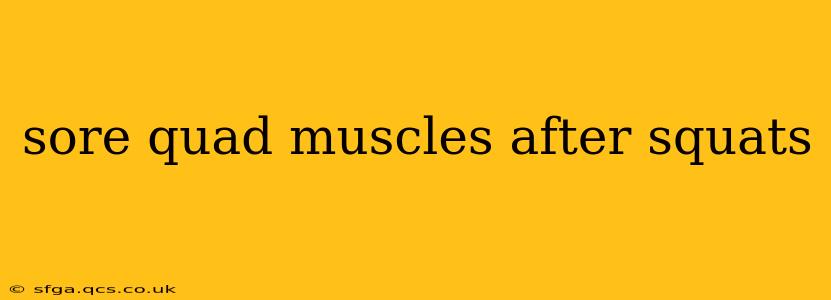Squats are a cornerstone of any effective leg workout, building strength and muscle mass in your quads, glutes, and hamstrings. However, the intense effort often leads to sore quad muscles in the days following a workout. This soreness, often referred to as Delayed Onset Muscle Soreness (DOMS), is a common experience, but understanding its causes, prevention strategies, and recovery methods can significantly improve your training experience.
Why Are My Quad Muscles Sore After Squats?
DOMS is the primary culprit behind sore quads after squats. It's caused by microscopic tears in your muscle fibers resulting from the strenuous activity. Your body responds by repairing these tears, leading to inflammation and the characteristic soreness you feel. The intensity of your workout, the depth of your squats, and the weight you lifted all contribute to the severity of DOMS. Improper form can also exacerbate muscle soreness by placing undue stress on specific muscle groups.
How Long Does Quad Soreness From Squats Last?
The duration of quad soreness after squats varies from person to person and depends on factors like your fitness level, the intensity of your workout, and your recovery strategies. Typically, you'll experience the most intense soreness 24-72 hours after your workout. Most people find the soreness significantly reduced after 3-5 days, with complete recovery within a week.
What Can I Do to Prevent Sore Quad Muscles After Squats?
Prevention is always better than cure. Here are several effective strategies to minimize quad soreness post-squat:
- Proper Warm-up: A thorough warm-up is crucial. This should include dynamic stretches like leg swings and torso twists, followed by lighter sets of squats to prepare your muscles for the heavier work ahead.
- Gradual Progression: Avoid drastically increasing the weight or intensity of your squats too quickly. Gradually increasing the weight and reps over time allows your muscles to adapt and reduces the risk of excessive soreness.
- Proper Form: Maintaining correct form during squats is essential. Focus on proper technique to ensure you are engaging the right muscles and distributing the load evenly, minimizing the risk of injury and excessive soreness. Consider working with a trainer to assess your form.
- Cool-down and Stretching: After your workout, perform a cool-down with light cardio and static stretches, holding each stretch for 20-30 seconds. This improves blood flow, aids in muscle recovery, and reduces stiffness.
How Can I Recover Faster From Sore Quad Muscles?
If you're already experiencing sore quads, focus on these recovery techniques:
- Rest and Recovery: Allow your muscles adequate time to repair. Avoid intense training of your legs until the soreness subsides.
- Active Recovery: Light activities like walking or cycling can improve blood flow and reduce stiffness without further straining your muscles.
- Nutrition: Ensure you're consuming a balanced diet rich in protein to support muscle repair. Stay hydrated by drinking plenty of water.
- Massage: Self-massage or professional sports massage can help ease muscle tension and improve circulation.
- Foam Rolling: Foam rolling can help to break up muscle knots and reduce stiffness.
Are Sore Quad Muscles After Squats a Sign of Injury?
While DOMS is typically benign, persistent or severe pain could indicate a more serious injury. If you experience:
- Sharp, stabbing pain
- Swelling
- Limited range of motion
- Pain that doesn't improve after a few days
Consult a doctor or physical therapist to rule out any underlying injuries.
How Can I Tell the Difference Between Soreness and Injury?
DOMS is a dull, achy pain that typically starts a day or two after exercise and gradually subsides. Injury pain is often sharp, localized, and may be accompanied by swelling, bruising, or instability. If you're unsure, it's always best to err on the side of caution and seek professional advice.
Should I Stop Squatting if My Quads Are Sore?
You don't necessarily need to stop squatting entirely, but it's crucial to listen to your body. If your soreness is mild, you can continue with lighter weights or fewer reps. However, if the pain is severe, it's best to take a break until the soreness subsides to avoid further injury.
By understanding the causes of sore quad muscles after squats, employing preventative measures, and utilizing effective recovery strategies, you can optimize your training, minimize discomfort, and continue progressing towards your fitness goals. Remember, consistency and proper technique are key to building strength and avoiding unnecessary pain.
